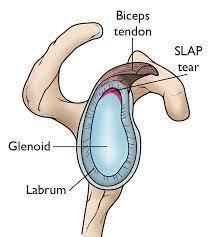
SLAP tears (or lesions) are an often overlooked shoulder injury ranging from asymptomatic to debilitating pain. It is essential to understand the basic anatomy of what is occurring to understand why this happens. The labrum is a cup-shaped rim of cartilage that lines and reinforces the ball and socket joint of the shoulder. The shoulder joint is composed of the glenoid (the shallow shoulder "socket") and the head of the upper arm bone known as the humerus (the "ball"). The labrum is the attachment site for the shoulder ligaments and joints as well as the rotator cuff tendons and muscles. It contributes to shoulder stability and, when torn, can lead to partial or complete shoulder dislocation. A SLAP lesion is an acronym for Superior Labrum Anterior Posterior, the most common glenoid labrum tear as opposed to less common tears like a Bankhart Lesion or Bennett Lesion. Common Symptoms of a SLAP Tear are:
- Pain with overhead or cross-body activities
- Snapping, popping, or catching with movement
- A sense of instability in the shoulder joint
- Decreased range of motion & strength
- Prior history of overuse or direct trauma (dislocation, or instability)
The presence of a SLAP lesion does not automatically mean that surgical intervention is necessary. Most experts, including the American Academy of Orthopedic Surgeons, recommend a 6-12 week course of conservative management prior to considering surgical intervention. Two-thirds of SLAP lesions will show symptomatic improvement via conservative care focusing on restoration of shoulder motion, rotator cuff strengthening, plus other biomechanical factors including the hip, core, and scapular stability.
Our primary goal is to focus on the pain and inflammation early on while increasing a pain-free range of motion and improving joint stability as the injury progresses. Initial interventions like Class IV Laser Therapy, Shockwave Therapy, and TECAR therapy can help expedite the early onset of pain and inflammation as well as improve the strengthening of the shoulder joint as a whole. Combining all of these evidence-based approaches can help improve the chances to heal more optimally and preserve your shoulder joint health.
Are you interested in how we can help with managing your shoulder pain and helping you return to doing what you love? Give us a call today at 727-228-3030 or schedule an appointment online at strengthchiro.com
.jpg)
.jpg)
